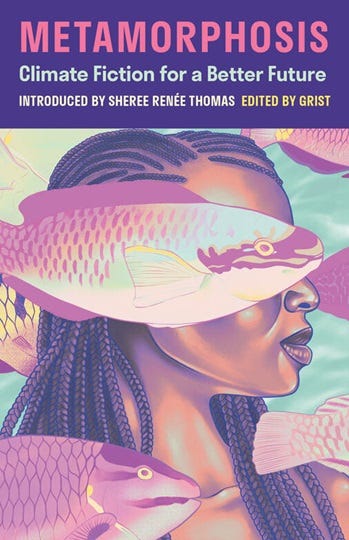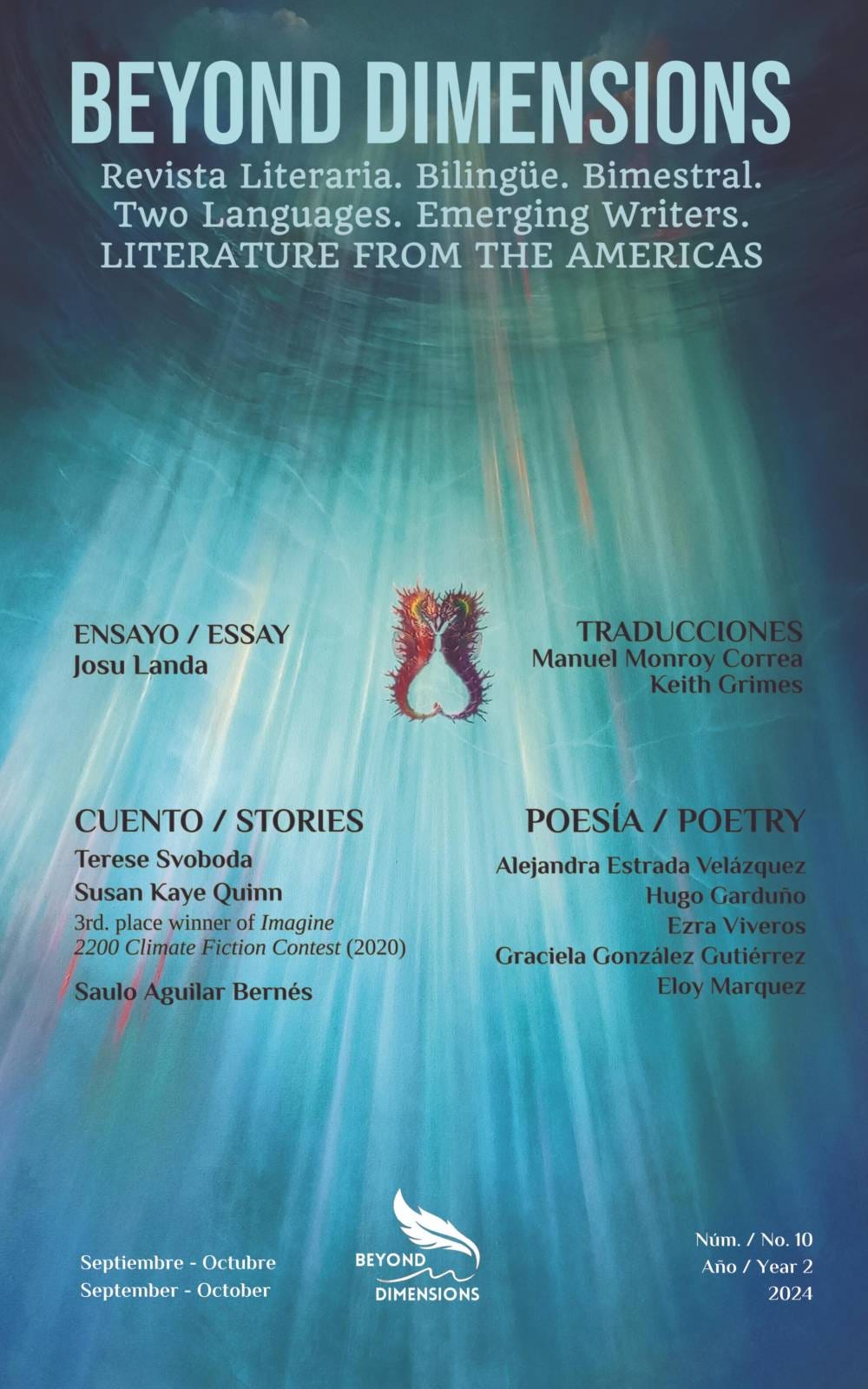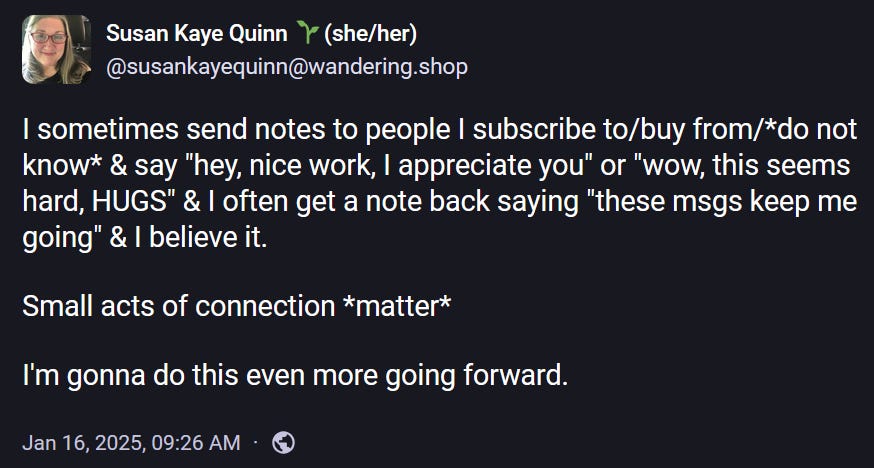I know the anxiety is free-floating in the air right now, like evil fascist pollen elevating the background stress of everyone who understands the dangers of a second Trump administration (already manifesting! Because people love to obey in advance!), which is why I’m bringing you a grab-bag of good things and hope (despite not having time to get the podcasts in my brain actually recorded and sent out to you yet).
Good Thing #1: New Hopeful Climate Fiction From Grist!
I’m such a huge fan of Grist’s Imagine 2200 contest because it consistently induces new and veteran authors to try their hand at envisioning a better world and then does a spectacular job of creating beautiful (human!) art to go with it. Plus Imagine 2200 and Bright Green Futures are super well-aligned in our vision of what hopeful climate fiction can look like.
From the creative director of Imagine 2200, Tory Stephens (who we had on the pod), in this year’s introduction:
The cultural diversity we humans offer each other is one of our greatest and most beautiful gifts. Stories that imagine the future can often treat culture as an afterthought, or assume that future societies will be homogeneous and devoid of culture diversity. But there’s something powerful in stories that reflect the complexity of the human experience and the challenges we face, and celebrate people’s culture, heritage and perspectives as a part of what there is to save – not as something we can stand to lose. After all, this diversity of experience and perspective is our greatest asset in coming up with solutions.
I could not agree more, and Tory and his team do an amazing job in bringing stories like this to the world. They’re online, they’re free to read, but if you want to support getting these stories out in the world, you can pick up a copy of Metamorphosis, a collection of 12 stories from 4 years of Imagine 2200 winners.
Good Thing #2: Bright Green Futures Website Refresh
The substack and the pod exist to surface hopeful climate fiction… but there is a lot of non-fiction directly relevant to writing these stories… and surprisingly (and delightfully) even academic studies about the stories and authors themselves and the impact they’re having.
So I’ve refreshed the organization of the website (see main page of the substack or click here).
Each of these lists serves a function:
Hopeful Climate Fiction: comprehensive list of fiction in every form: short stories, novels, collections, poetry, even films
Climate Non-Fiction: essays, books, and videos that discuss solarpunk (movement or literature) and ideas that inform solarpunk stories
Academic Studies: academic theses about solarpunk, relevant academic papers, and teaching resources for positive climate visioning
Solarpunk Starter Pack: four collections of short stories to get you started
Part of the goal of Bright Green Futures is to create a small online library or guide to this imaginative work that’s being created to envision a better future: the works themselves, which use hopeful fiction to grapple seriously with the near-future climate crisis, the essays and non-fiction resources that inform how to create these stories and what a better world can look like (as well as seeing clearly the one we’re in), the academics who are studying the works and helping educate people about the possibilities, and then the starter pack to give an accessible starting point for people to dive in.
I’m excited by how this movement just keeps growing, and I’ll try to keep up with the format of the pod and the substack/website.
Good Thing #3: Guest on Future Mending Podcast
I loved being a guest on the Future Mending podcast! It’s got such a cool solarpunk vibe, looking at climate solutions like clothing swaps happening right now.
During the episode, I name dropped Bright Green Futures guests (Renan Bernardo, Sarena Ullibari, Ana Sun) and read an excerpt from one of T.K. Rex’s stories, to which Matt added sound effects! So fun.
Checkout this excerpt:
We generally chatted about how we all can build a better world.
Good Thing #4: Seven Sisters in a Spanish/Bilingual Magazine
I was delighted to find my story Seven Sisters has been translated to Spanish in a bilingual English-Spanish literary magazine dedicated to “Literature from the Americas”!
As hard times and broken bots threaten a collective tea farm, the women keeping it going must decide whether to add another to their ranks.
Cuando en momentos difíciles, los robots se averían y ponen en riesgo al colectivo de una granja de té, las mujeres que la administran deciden si alguien más se añadirá o no a sus filas.
Whew, that’s a lot of good things. Which is not to say terrible things aren’t also happening in the world. As I mentioned on Future Mending, it’s hard for us to wrap our heads around the fact that good things and bad things co-exist, all the time, always. We tend to think (or believe in our hearts) that things must be all good or all bad, but that kind of all-or-nothing approach isn’t what gets us through. It’s just not adaptive for the 21st Century, which is gonna be a whole lot of rough sailing. We can’t be blind to the fires in LA (I’m certainly not, given my middle kiddo is still evacuated). We shouldn’t underestimate the psychic toll that chaos at the highest levels of government can cause, even when we’re not directly effected (and especially when we are). But there is also beauty and wonder and kindness, often intimately connected with those things causing such destruction. The outpouring of kindness and help in LA is real and dramatic. For every high-profile media outlet and billionaire I see bending a knee, I see tons of determined resistance to fascism all around me.
Even tiny moments like an email coming back from a gentle good wish I’d sent out.
A small act of kindness won’t save the world. Then again, that’s not its purpose: its purpose is to bolster one person in one moment of time. As a friend who’s passionate about feeding people (as I am too) noted, when he got criticism about his free fridges “not working” (in the sense that they’d only lasted for a short while): “I fed someone. I’ve already succeeded.”
Putting our heads down, doing the work, making the extra effort to connect and be kind: those aren’t things that “save the world.”
They’re the things that make the world worth saving.
Be well, friends, and I’ll have a podcast coming soon for you.
Sue










